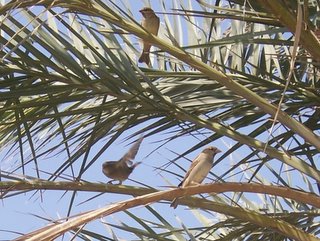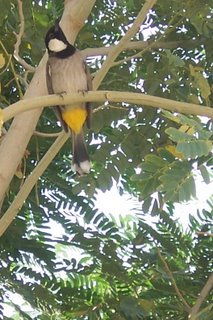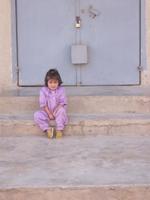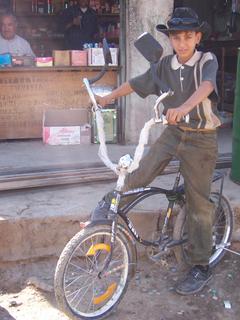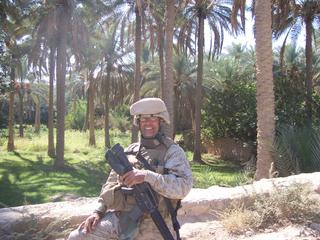
Is "trudgery" a word, if not it should be. I'm finally all cleaned up after a couple weeks of pure trudgery. Laundry has been dropped off and retrieved, fresh clothing put on and multiple hot showers enjoyed. Every trip I've undertaken over here takes on its own theme. During my April-May 2005 trip to eastern Afghanistan the phrase "storm and stone" kept popping into my brain-housing. The Operation Iraqi Freedom sojourn of 2003 was characterized by the words "fire and ice". And now the word trudgery, from the word trudge springs to mind. That's what these Marines do everyday, all day, trudge. They trudge the mean streets, fields and palm groves of Iraq from dawn til dusk til dawn with pure dogged grit and fortitude. They trudge with 40 to 60 pounds of gear, gulping down hot water and soaking their uniforms to the knees with sweat. After these trudges comes hours of "working parties" filling sandbags, burning human waste in diesel fuel, unloading tons of MREs and water, cleaning dusty weapons, and finding time for short catnaps and letter writing. And they do it all with humor, panache, professionalism, and with constant friendly "salaam"s to the Iraqis,and encouragement to each other. Where else in the world are American teenagers and twenty-somethings desribed as having grit and fortitude? People always ask me why I want to return to this experience. Among many reasons, the most compelling for me is to be in the company of adults. Young men and women who've made the transition to authentic adulthood in a culture that seems perpetually stuck in the affectations of hyped-up adolescence. I am surrounded here by the culture of the responsible, and not the society of the entitled. I am immersed in a baptismal font of pure unadulterated characters, of individuals refined in the cruelest and most demanding of crucibles, war. More than the actual visual qualities of my surroundings, it is the sharing of hardship and the getting to know these fellow Marines that I hope informs my art and gives it its validity and punch.
Besides the dusty streets of Haditha I visited and lived for a couple days at Haditha Dam. The dam is a hulking earthen and concrete presence in an otherwise featureless terrain. Built about 18 years ago with Soviet and Yugoslav assistance, it now houses elements of Regimental Combat Team 2 (RCT2)of the 2nd Marine Expeditionary Force (IIMEF). The Marines live inside the dam in a labyrinth of dusty and dark hallways and ladderwells. Episodes from Lord of the Rings come to mind. I half expected to see poor Gollum skulking about the place. Getting around the place demands a detailed mental map and a readiness to climb stairs, lots of stairs. The place has ten levels and there are 4 sets of steps between levels. The hydroelectric generating capability of the dam is probably only a fraction of its pre-war output. It was interesting to wander around the place and see the number of countries whose products and services went into both the creation of the place and its maintenance. I saw American valves, French control panels, Chinese manhole covers, Russian hoists, German switches and circuit breakers (not to mention the abandoned Mercedes parked about the place) and Yugoslav concrete work. Peace advocates always like to play the economic political card, you know the one where powerful countries can have influence over errant ones through economic pressure. It seems to me that while all these countries were doing business with Saddam's government, Saddam was putting his victims in the ground faster than Famous Amos was putting cookies in the oven.
Here's a pic of yours truly in all my trudgeness.
